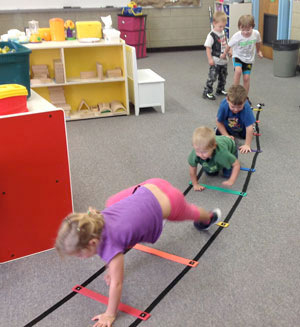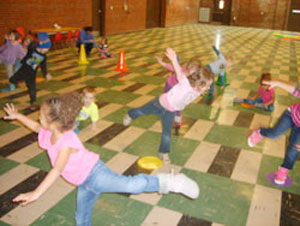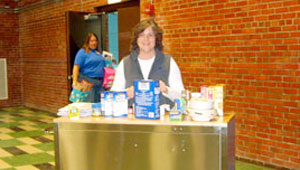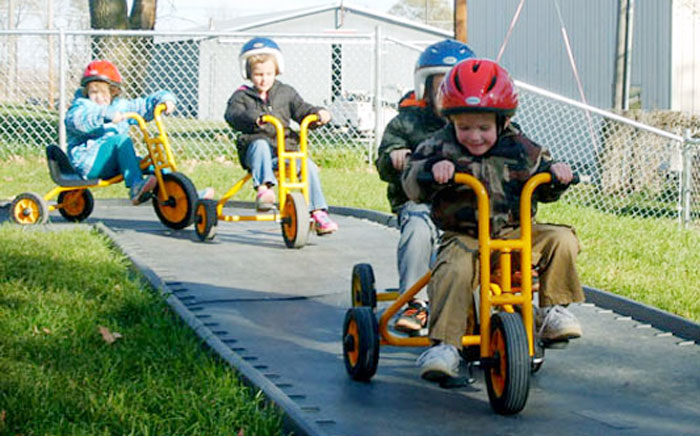Healthy Early Learning Project (HELP)
- Need: An ongoing health need to alleviate early childhood obesity in the rural Kansas counties of Marshall and Nemaha.
- Intervention: 5 distinct physical and nutritional programs were introduced to 9 preschool sites through the overarching Healthy Early Learning Project (HELP).
- Results: HELP comprehensively increased children's physical activity and healthy food consumption and established a sustainable presence at each preschool site.
Evidence-level
Promising (About evidence-level criteria)Description
Several factors indicated a need to address early childhood obesity in the service area of Kansas's Marshall and Nemaha counties. An analysis of the 9 sites found that 28% of 3- to 5-year-old preschool students were classified as overweight/obese. In addition, no site contained health advisory teams, and physical and nutritional management was underwhelming.
 Unified School
District #498 Valley Heights and 11 consortium partners
created the Healthy Early Learning Project (HELP) to take
up the challenge of early childhood obesity at 9
preschool sites. HELP was implemented at 6 public school
preschool sites, 3 Head Start sites, and 4 district
Parents as Teachers programs. All sites held the target
population of children ages 0-5.
Unified School
District #498 Valley Heights and 11 consortium partners
created the Healthy Early Learning Project (HELP) to take
up the challenge of early childhood obesity at 9
preschool sites. HELP was implemented at 6 public school
preschool sites, 3 Head Start sites, and 4 district
Parents as Teachers programs. All sites held the target
population of children ages 0-5.
HELP was built on a model that had been previously developed for kindergarten-12th grade students in the same counties. Like its model, HELP used research and evidence-based physical activity and nutrition curriculum to increase activity levels of students, along with their consumption of fruits and vegetables. The only deviation in HELP from the original model was the age of the target population.
This program received support from a 2012-2015 Federal Office of Rural Health Policy (FORHP) Rural Health Care Services Outreach grant. After the grant ended, some schools have closed and HELP sites have been combined. Today, 7 preschool sites serve 9 communities. At the conclusion of the grant cycle, evidence-based activities were integrated into the preschool and Head Start environments, but data are no longer being tracked.
Services offered
HELP adopted 5 methods from its adapted model. These include:
Sports, Play & Active Recreation for Kids (SPARK) Early Childhood Physical Activity Program - SPARK is designed to provide children ages 3-5 with active, academically integrated, and enjoyable movement opportunities. The goal is to foster social and motor development and enhance school readiness skills.
 Action Based
Learning (ABL) - This program uses physical
movement, balancing, cross-body motion, eye tracking, and
spatial awareness to help children learn while moving.
Action Based
Learning (ABL) - This program uses physical
movement, balancing, cross-body motion, eye tracking, and
spatial awareness to help children learn while moving.
Book in a Bag - This program is created to encourage young children's interest in foods, nutrition, and reading in a small group setting. Children learn about nutrition by having age-appropriate storybooks with food-related themes read to them, then participating in hands-on food and nutrition activities.
 Power Panther
Preschool - Designed to encourage consumption of
fruits and vegetables, Power Panther Preschool increases
children's exposure to a variety of fruits and
vegetables. Children learn about new foods in a positive
experience and learn more about how their bodies function
when different kinds of food are eaten.
Power Panther
Preschool - Designed to encourage consumption of
fruits and vegetables, Power Panther Preschool increases
children's exposure to a variety of fruits and
vegetables. Children learn about new foods in a positive
experience and learn more about how their bodies function
when different kinds of food are eaten.
Learning about Nutrition through Activities (LANA) Preschool Program - Kids play and learn at the same time, building the critical skills for making healthy eating choices.
Results
By the third year of the grant:
- CDC-recommended physical activity of 60 minutes per day increased from 31% to 98%.
- Preschool sites that offered fruits and vegetables as a daily snack increased from 52% to 100%.
- Parents who reported their child consuming two or more servings of fruit per day and three or more servings of vegetables per day increased from 41% to 69%.
- All 9 preschool sites created health advisory teams and implemented 5-year strategic plans.
- All 9 preschool sites had drafted policies for nutrition and physical activity.
- All 9 preschool sites dispersed nutrition and physical activity information to parents.

Challenges
Most barriers, such as the extended illness of the Associate Director and the Project Director's reduced hours due to other grant priorities, were specific to the people of the program rather than the project itself. However, some issues did arise that should be taken into consideration:
- Finding a time for participants of the preschools' Health Advisory Teams to meet. This was resolved using email, conference calls, and videoconferencing.
- Securing nutrition training for preschool instructors since the curriculum did not offer professional development. This challenge was resolved by researching additional nutrition training that provided enhancement to the curriculum and resources the preschools already had in place as a result of the grant project.
- Inconsistency with parents returning fruit and vegetable consumption surveys
- The learning curve of preschool instructors working with grant data collection, especially when it included the use of technology
- A lag in response time between program directors and the outside evaluator for data collection
Replication
Most activities in the program are meant to be incorporated into the school setting, so replication is applicable for other locations. For instance, all of the physical activity and nutrition curriculum purchased and implemented during the program period can be utilized in any type of preschool environment, as demonstrated by both the participation of Head Start preschools and school-based preschools in the grant project.
Contact Information
Amanda Parthemer, Project DirectorSchool-Business Educational Consortium
785.292.4453
amandap@bluevalley.net
Topics
Children and youth
· Food security and nutrition
· Obesity and weight control
· Physical activity
· Schools
States served
Kansas
Date added
October 26, 2015
Suggested citation: Rural Health Information Hub, 2025 . Healthy Early Learning Project (HELP) [online]. Rural Health Information Hub. Available at: https://www.ruralhealthinfo.org/project-examples/848 [Accessed 27 February 2026]
Please contact the models and innovations contact directly for the most complete and current information about this program. Summaries of models and innovations are provided by RHIhub for your convenience. The programs described are not endorsed by RHIhub or by the Federal Office of Rural Health Policy. Each rural community should consider whether a particular project or approach is a good match for their community’s needs and capacity. While it is sometimes possible to adapt program components to match your resources, keep in mind that changes to the program design may impact results.
